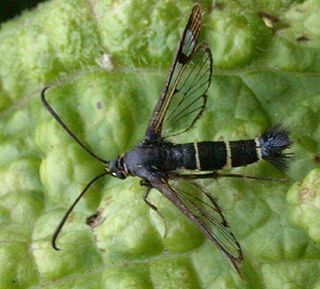
The Sesiidae or clearwing moths are a diurnal moth family in the order Lepidoptera known for their Batesian mimicry in both appearance and behaviour of various Hymenoptera.

The Hepialidae are a family of insects in the lepidopteran order. Moths of this family are often referred to as swift moths or ghost moths.
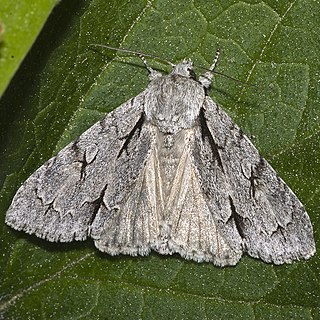
Acronicta is a genus of noctuid moths containing about 150 species distributed mainly in the temperate Holarctic, with some in adjacent subtropical regions. The genus was erected by Carl Linnaeus in his 1758 10th edition of Systema Naturae. Caterpillars of most Acronicta species are unmistakable, with brightly colored hairy spikes, and often feed quite visibly on common foliate trees. The hairy spikes may contain poison, which cause itchy, painful, swollen rash in humans on contact. The larva of the smeared dagger moth is unusually hairy even for this genus. Acronicta species are generally known as dagger moths, as most have one or more black dagger-shaped markings on their forewing uppersides. But some species have a conspicuous dark ring marking instead.

Cosmosoma is a genus of tiger moths in the subfamily Arctiinae. The genus was erected by Jacob Hübner in 1823.

Ctenucha is a genus of moths in the family Erebidae.

Eucereon is a genus of tiger moths in the family Erebidae. The genus was erected by Jacob Hübner in 1819.
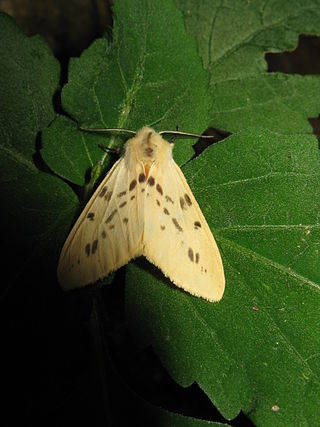
Lemyra is a genus of tiger moths in the family Erebidae. The genus contains many species from East and South Asia, Sundaland and Australia. It was described by Francis Walker in 1856.
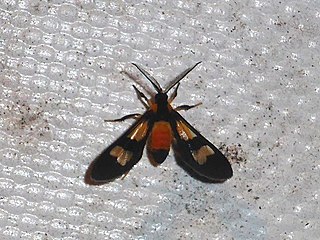
Leucotmemis is a genus of moths in the subfamily Arctiinae. The genus was erected by Arthur Gardiner Butler in 1876.
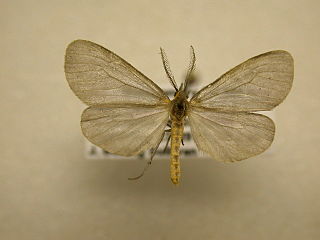
Pagara is a monotypic moth genus in the family Erebidae. Its only species, Pagara simplex, the mouse-colored lichen moth, is found in North America, where it has been recorded from Alabama, Arkansas, Florida, Georgia, Illinois, Indiana, Iowa, Kansas, Kentucky, Maryland, Mississippi, New Hampshire, North Carolina, Ohio, Oklahoma, South Carolina and Tennessee. Both the genus and species were described by Francis Walker in 1856.

Pseudosphex is a genus of tiger moths in the family Erebidae. The genus was erected by Jacob Hübner in 1818. These moths are mimics of a variety of Hymenoptera. The prefix pseudo means "false", and Sphex is a genus of wasps.
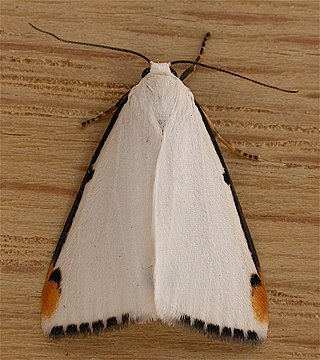
Termessa is a genus of moths in the subfamily Arctiinae The genus was described by Newman in 1856.

Acontia is a genus of moths of the family Noctuidae. The genus was named by Ferdinand Ochsenheimer in 1816. Eusceptis, Pseudalypia and Spragueia are sometimes included in the present genus, but here they are tentatively treated as different pending further research. Many species of Tarache were also once placed here.
Obrima is a genus of moths in the family Erebidae. The genus was erected by Francis Walker in 1856.

Somena is a genus of tussock moths in the family Erebidae. The genus was erected by Francis Walker in 1856.
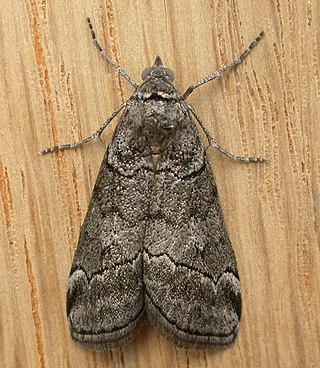
Corula is a monotypic moth genus in the family Geometridae. Its only species, Corula geometroides, the ash-grey geometrid, is found in Australia. Both the genus and species were first described by Francis Walker in 1856.

Smerinthini is a tribe of moths of the family Sphingidae. The genus was erected by Augustus Radcliffe Grote and Herbert C. Robinson in 1865.
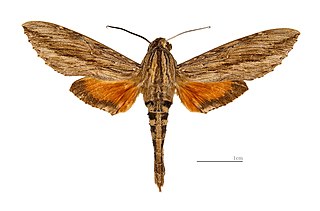
Dilophonotini is a tribe of moths of the family Sphingidae described by Hermann Burmeister in 1878.
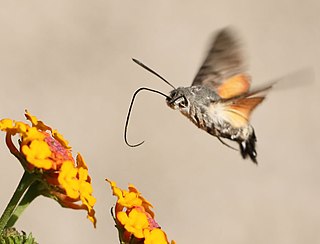
Macroglossini is a tribe of moths of the family Sphingidae described by Thaddeus William Harris in 1839.
Sidyma albifinis is a moth in the subfamily Arctiinae. It was described by Francis Walker in 1856. It is found in the Himalayas.

Sidymella is a genus of spider in the family Thomisidae, found in South America, Australia and New Zealand. It was originally named Sidyma, but this was later found to have been used already for a genus of moths.

















